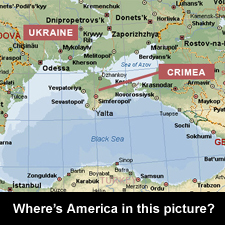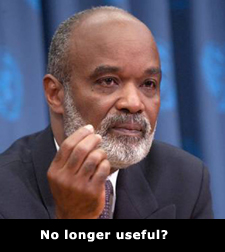I sometimes forget how Bill Clinton turned my parents into hawks. In these troubled times, it’s worth remembering the degree to which people’s political affiliation determines their worldview. If George W. Bush dropped bombs on Serbia, mom and dad would have been against it, but Bill Clinton … he must have had a reason.
We’re seeing some of the same effect with Obama. His new policy on Iraq and Syria differs from George W. Bush’s Iraq policy mostly in its implementation. Bush trumpeted his intention to go in strong, drop a bunch of bombs, “shock and awe” them. Obama is incrementalist – we’ll do A but not B, then a week later, we’re doing B and C with promises (soon broken) that we won’t move on to D. Ultimately this ends up with regime change, as it did in Libya with disastrous results. What’s the difference? Psychology. Obama knows marketing. He knows that we’ll only eat one or two of those big cookies, but a boat load of those little ones.
 The media, as always, is in the tank for this war. On the morning after bombing began in Syria, the first voice you heard on NPR’s 6:00 a.m. newscast was that of a retired general who had “crafted” America’s bombing campaign during the Gulf War – a man who thought we weren’t bombing Syria hard enough. That’s NPR, no surprise, but don’t expect any better from the liberal media. Rachel Maddow, while a war skeptic, gave a thumbnail recent history of the Iraqi Kurds and the Gulf War that might have been torn out of a Bush campaign media release. Our only role in that saga, according to this telling, was liberating freedom-loving Kuwait and helping the Kurds preserve evidence of Saddam’s pogrom against them.
The media, as always, is in the tank for this war. On the morning after bombing began in Syria, the first voice you heard on NPR’s 6:00 a.m. newscast was that of a retired general who had “crafted” America’s bombing campaign during the Gulf War – a man who thought we weren’t bombing Syria hard enough. That’s NPR, no surprise, but don’t expect any better from the liberal media. Rachel Maddow, while a war skeptic, gave a thumbnail recent history of the Iraqi Kurds and the Gulf War that might have been torn out of a Bush campaign media release. Our only role in that saga, according to this telling, was liberating freedom-loving Kuwait and helping the Kurds preserve evidence of Saddam’s pogrom against them.
Maddow left out the small detail that the U.S. helped Saddam to the hilt throughout the 1980s, including during the campaign against the Kurds, then looked the other way when Saddam attacked them again after the Gulf War (until Bush I was shamed into establishing a no-fly zone in northern Iraq). I suppose I should excuse this level of ignorance due to her relative youth – she probably doesn’t remember the events very clearly. I sure as hell do. It was the genesis of the conflict we are entering now, just as our Afghan war was the birth of Al Qaeda.
We go through this cycle of attack repeatedly, and the results are always the same – a bigger mess, more people hating us, more misery in the region. The fact that people like Maddow, who should know better, don’t understand that makes it that much harder to stop this from happening yet again.
luv u,
jp

 be sure. There is a referendum on Crimean secession scheduled for later this month, and the new Ukrainian government is crying foul. So … are we on the brink of a new Crimean War? Charge of the Light Brigade, anyone?
be sure. There is a referendum on Crimean secession scheduled for later this month, and the new Ukrainian government is crying foul. So … are we on the brink of a new Crimean War? Charge of the Light Brigade, anyone? That potentially catastrophic confrontation-in-waiting apparently can withstand mock-invasions of North Korea and simulated bombing runs without being “provocative”. So, why are the Russian exercises any worse? If there’s a return to Cold War mentality, it’s on the part of our corporate media. (Most of our politicians have never left that particular ideological space.)
That potentially catastrophic confrontation-in-waiting apparently can withstand mock-invasions of North Korea and simulated bombing runs without being “provocative”. So, why are the Russian exercises any worse? If there’s a return to Cold War mentality, it’s on the part of our corporate media. (Most of our politicians have never left that particular ideological space.) Really? Just a little bit of context might be nice. What was Kerry doing there in the 1960s again? Vacationing? No. Oh, that’s right – he was part of a massive invasion force that was grinding Vietnam – particularly southern Vietnam – to a bloody pulp, leaving probably 2 million dead and three countries destroyed; a massive crime that we have never been held accountable for. I think it’s a little premature to lecture Hanoi on human rights, frankly.
Really? Just a little bit of context might be nice. What was Kerry doing there in the 1960s again? Vacationing? No. Oh, that’s right – he was part of a massive invasion force that was grinding Vietnam – particularly southern Vietnam – to a bloody pulp, leaving probably 2 million dead and three countries destroyed; a massive crime that we have never been held accountable for. I think it’s a little premature to lecture Hanoi on human rights, frankly. I think if we’ve learned anything over the last thirty-five years it’s that the United States does not want any detente with the Iranian government, no matter how accommodating they become. We saw this with the Khatami government, which was very moderate and reformist and yet ended up on the “Axis of Evil” shortlist. Frankly, our leaders much prefer it when Iran elects presidents like Amedinejad, who are conveniently cartoon-like, racist, and easy to demonize. It’s the Rouhani’s who give them a belly ache.
I think if we’ve learned anything over the last thirty-five years it’s that the United States does not want any detente with the Iranian government, no matter how accommodating they become. We saw this with the Khatami government, which was very moderate and reformist and yet ended up on the “Axis of Evil” shortlist. Frankly, our leaders much prefer it when Iran elects presidents like Amedinejad, who are conveniently cartoon-like, racist, and easy to demonize. It’s the Rouhani’s who give them a belly ache. Sure, he’s Simon the Likeable. I think of it as the liberal equivalent of conservatives seeing W. Bush as someone they would like to have a beer with. Obama has an appealing persona to people like me, mostly because he’s the first president in my lifetime that shares our experience. Of course, those considerations are an empty category, politically speaking. It doesn’t matter at all whether or not I “like” this man I don’t know. What matters is how he handles driving the enormous killing machine that is the American Presidency.
Sure, he’s Simon the Likeable. I think of it as the liberal equivalent of conservatives seeing W. Bush as someone they would like to have a beer with. Obama has an appealing persona to people like me, mostly because he’s the first president in my lifetime that shares our experience. Of course, those considerations are an empty category, politically speaking. It doesn’t matter at all whether or not I “like” this man I don’t know. What matters is how he handles driving the enormous killing machine that is the American Presidency. The reaction from South America has not been positive, as one might expect. Leaders from Venezuela, Argentina, Ecuador, and other countries have gathered in solidarity with Morales (who is now back home). This will likely be viewed by Washington as the usual suspects railing against American imperialism, blah blah blah. I’m sure Juan Ferarro will be on NPR tomorrow talking about how over the top their reaction is. But let’s consider this: why would we provoke such a negative reaction so gratuitously? What the fuck is the Obama Administration playing at here?
The reaction from South America has not been positive, as one might expect. Leaders from Venezuela, Argentina, Ecuador, and other countries have gathered in solidarity with Morales (who is now back home). This will likely be viewed by Washington as the usual suspects railing against American imperialism, blah blah blah. I’m sure Juan Ferarro will be on NPR tomorrow talking about how over the top their reaction is. But let’s consider this: why would we provoke such a negative reaction so gratuitously? What the fuck is the Obama Administration playing at here? I think I felt the earth tremble just then. Yeah, nobody wants that … really. And yet there is a very real possibility that many of the same people who ran Bush’s foreign policy – including the most extreme of the neoconservative cadre – could have their sweaty, blood-stained hands back on the levers of imperial power this coming January. The cabal advising Mitt Romney is basically a reunion tour of the nasty little group that started the Iraq war. Ari Berman ticked through their ranks in
I think I felt the earth tremble just then. Yeah, nobody wants that … really. And yet there is a very real possibility that many of the same people who ran Bush’s foreign policy – including the most extreme of the neoconservative cadre – could have their sweaty, blood-stained hands back on the levers of imperial power this coming January. The cabal advising Mitt Romney is basically a reunion tour of the nasty little group that started the Iraq war. Ari Berman ticked through their ranks in  the U.S./French – favored Duvalierist candidate to participate in the run-off for the now disputed Presidential race. Baby Doc is there to rally his supporters, in case Preval hasn’t been getting the message. In as much as there has been talk of sending Preval into exile, I have to think he’s feeling more than a bit pressed. Ives points out that, after having been supine before the demands of the U.S., France, and Canada, Preval is facing deportation over his first disagreement with the international community overlords he has so faithfully served. This is independence?
the U.S./French – favored Duvalierist candidate to participate in the run-off for the now disputed Presidential race. Baby Doc is there to rally his supporters, in case Preval hasn’t been getting the message. In as much as there has been talk of sending Preval into exile, I have to think he’s feeling more than a bit pressed. Ives points out that, after having been supine before the demands of the U.S., France, and Canada, Preval is facing deportation over his first disagreement with the international community overlords he has so faithfully served. This is independence?